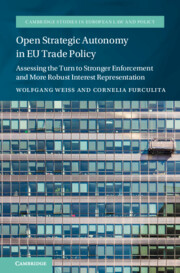 Open Strategic Autonomy in EU Trade Policy
Open Strategic Autonomy in EU Trade Policy Book contents
- Open Strategic Autonomy in EU Trade Policy
- Cambridge Studies in European Law and Policy
- Open Strategic Autonomy in EU Trade Policy
- Copyright page
- Contents
- Preface
- Abbreviations
- 1 Introduction
- Part I EU Trade Policy and Its Constraints
- 2 The EU’s Trade Policy
- 3 External and Internal Constraints for the EU’s Open Strategic Autonomy in Trade Policy
- Part II The Tools for Stronger Enforcement of Trade Rights
- Part III The Tools for Assertive Representation of EU Interests
- Bibliography
- Index
3 - External and Internal Constraints for the EU’s Open Strategic Autonomy in Trade Policy
from Part I - EU Trade Policy and Its Constraints
Published online by Cambridge University Press: 29 November 2024
- Open Strategic Autonomy in EU Trade Policy
- Cambridge Studies in European Law and Policy
- Open Strategic Autonomy in EU Trade Policy
- Copyright page
- Contents
- Preface
- Abbreviations
- 1 Introduction
- Part I EU Trade Policy and Its Constraints
- 2 The EU’s Trade Policy
- 3 External and Internal Constraints for the EU’s Open Strategic Autonomy in Trade Policy
- Part II The Tools for Stronger Enforcement of Trade Rights
- Part III The Tools for Assertive Representation of EU Interests
- Bibliography
- Index
Summary
As EU’s Renewed Trade Policy seeks to combine its multilateralist stance with a more autonomous approach, this chapter presents the external and internal constraints that the EU should take into account in order to succeed in its endeavor. Chapter 3 argues that EU’s pledge to multilateralism becomes important not only in view of its importance for EU’s credibility in external relations but also because it is enshrined in its constitutional norms. Accordingly, the chapter briefly delves into the question of the relationship between EU and international law, the importance of respecting the latter, including from an internal constitutional perspective, and the internal and external consequences of international law breaches by EU law. It focuses on the constitutional justification of the EU’s obligation to respect its international law commitments, as well as the CJEU case law on this question, especially on the potential restriction posed by the Autonomy of the EU legal order. The chapter also briefly identifies pertinent WTO, EU FTAs, and general international law rules that could act as external restraints, and explains how the mere existence of EU legislation might violate them.
Keywords
- Type
- Chapter
- Information
- Open Strategic Autonomy in EU Trade PolicyAssessing the Turn to Stronger Enforcement and More Robust Interest Representation, pp. 63 - 122Publisher: Cambridge University PressPrint publication year: 2024
